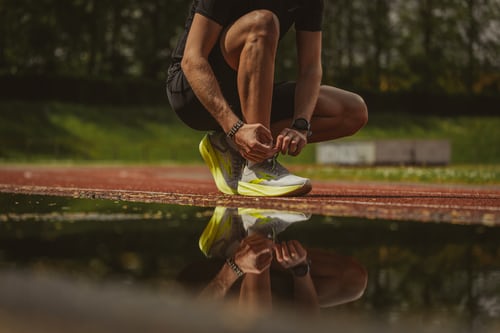Many different people follow the keto diet for weight loss. However, one area of controversy that many people argue is that being on the keto diet affects athletic performance, and workouts are widely debated. Many argue that ketosis drains energy levels and makes muscle growth more challenging.
Many on the keto diet opt for cardio when it comes specifically to cardio that keeps heart rates lower and steadier for longer periods of time. Others include bouts of HIIT training even while on the fat-burning keto diet.

Will My Workout Performance Suffer While on Keto?
During the first few weeks of keto, you may feel a bit sluggish and feel that you do not perform as well during the first few weeks on a keto diet. Your body is transitioning from burning carbohydrates to burning body fat for fuel. Your body is going through a learning experience, too! If you do longer workouts that are more glycolytic in nature, you may notice your performance deteriorates more over time.
How Do I Remedy Temporary Performance Decrements?
There are several remedies that you can use to try to help offset the problem. If you notice, your performance is a little less intense as your body transitions to a keto diet. That includes trying some following:
Lower the Intensity:
Consider doing less intense or frequent workouts throughout the first few weeks of your keto diet. Doing less intense workouts until your body adapts to your new energy source. Doing this gives you time to learn how to maximize the energy source of fat your body is now receiving.
Balance Your Electrolytes:
If you balance your electrolytes, you will have a lot more energy than you do if you are dehydrated and missing energy sources. Add a 1/4 to 1/2 teaspoon of salt and lemon to a glass of water if you feel lightheaded and see if it helps. Your body needs about 4.5 grams of salt, 300 to 400 mg of magnesium, and 1-2 grams of potassium on top of your average food intake when on a keto diet.
Just Keto Things also has these ideas on supplementing your electrolytes and essential nutrients and minerals.
Provide Your Body with an Energy Source:
When you switch to a keto diet, be sure to provide your body with an energy source so that your body can burn stored body fat effectively. Your body is going through the shock of not having carbohydrates available to burn as energy, so be sure to provide your body with plenty of calories (and fat) to burn off as it adjusts to your new diet.
Give Your Body Time:
Your body is going to take time to adapt to the new fuel source that it’s receiving. It may take three to six weeks for all of the unpleasant side-effects that you experience to subside completely. So be patient and give your body time to transition.
Should I Eat Carbs to Fuel My Workout?
As you go into keto, you should not add carbs back into your diet for the first few weeks of your diet period. After that, you can dial back your workouts to help make them more manageable instead. Ideally, you want to stay in ketosis to promote a low-insulin state of ketosis, which helps your body burn off your stored body fat. You will need a minimum of three weeks of strict, dedicated keto and six weeks is ideal if possible.
Once you get past your keto period, then you have to decide what will work best for you there. If you feel good in a strict state of ketosis where you consume less than 50 grams of net carbohydrates per day, then continuing that way long-term is excellent.
Otherwise, you can choose to eat a limited amount of carbs right before a high-intensity workout and see if that helps with your workout performance. You want to calculate what you eat carefully. Consume no more than 25 to 30 grams of carbohydrates before a workout. Be sure that you understand what an actual high-intensity workout looks like and stop underestimating your glycogen stores.
Even on a keto diet, your body still has about 50% of its glycogen stores left. Your body does not suddenly operate with “no glycogen.” If you choose to consume more carbs, strategically before or after tough workouts or even between” hard sessions,” make sure to keep the carbohydrates proportionate to the intensity of the exercise you are doing. For exhale, if you are taking a Pilates or yoga class, then you can probably skip the carb-up beforehand.

What Does My Body Use As Fuel for Workouts?
When you do a high-intensity workout, the workout is fueled by carbohydrates, while your lower-intensity workouts are fueled by fat as the primary source of energy. Therefore, when you are in ketosis, the workouts best suited to your current lifestyle are moderate in intensity. In addition, the moderate-intensity workouts are more manageable when in keto, whereas you may realize your performance will lack on higher-intensity workouts.
What If I’m An Athlete?
The goal for athletes is not only to use keto to boost their overall health but to boost their performance, too! Depending on the type of athlete you are, keto may help or hinder your performance.
Here we will look at our different types of athletes to see who keto may help and who it may not help:
Endurance Athletes:
Endurance athletes who do longer bouts of lower intensity exercise often find that keto boosts their performance. Most endurance athletes do not use keto diets to lose weight but rather improve and boost their performance. Many endurance athletes also use this diet to improve their overall health. Keto diets are often used by athletes, like distance runners, powerlifters, or Olympic weightlifters. The longer you have moderate intensity in an activity or workout, the more you will benefit from the increased energy that a keto diet can provide for you.
Sprint Athletes:
Sprint athletes who either participate in short sprints like sprinting runners or those who play team sports that revolve around sprints with short rest periods in between will probably not find keto benefiting their performance. Some people may feel energized and alive while consuming fewer carbs, but most athletes in sprint-related sports will not feel their endurance and performance improve when they cut carbohydrates out of their diet. Finding the balance that works for you will be the key to finding a carbohydrate and keto balance that works for you if you are a sprint sport athlete.
Key Takeaways: Optimizing Cardiovascular Workouts on Keto
In the end, it’s about knowing your body and understanding when you need to go into ketosis and how to keep your body in a state of ketosis. Athletes may consume carbohydrates at certain strategic times by their workout and competition schedules. Otherwise, they may follow a ketogenic diet to enjoy the health and fat-loss benefits that the diet provides. Every individual’s body will handle the diet differently. You will need to use trial-and-error to learn how your body processes carbohydrates and how you need to consume them strategically to best suit your body’s individual needs.